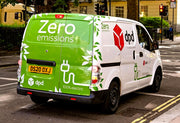What Is Organic Cotton (and Is It Better for Printing)?

🌱 The Fabric Behind the Print
Cotton is everywhere — more than half the clothes sold in the UK are made from it. But while most people see it only once it’s hanging on a hanger, every T-shirt began life in a field. From fluffy white fibre to the soft fabric you wear daily, cotton has always been the world’s go-to cloth.
The problem? Not all cotton is created equal. Conventional cotton farming often relies on heavy pesticide use, chemical fertilisers, and vast amounts of water — all of which come at a cost to people and the planet. That’s where organic cotton steps in.
In this article, we’ll unpack what organic cotton really means, why it’s seen as a sustainable game-changer, and — crucially — whether it’s actually the best fabric for modern printing methods like DTG, DTF, and even vinyl. By the end, you’ll know if custom clothing on organic blanks should be the foundation of your next run.
🌍 What Exactly Is Organic Cotton?
Organic cotton is grown using natural methods that protect the soil, water, and people involved in the process. Unlike conventional cotton, which relies on chemical pesticides, synthetic fertilisers, and genetically modified seeds, organic farming avoids harmful inputs and works in harmony with nature, rather than against it.
For brands and printers, this means selecting fabrics that are safer for farmers, more environmentally friendly, and proven to produce softer, higher-quality garments. It’s why many of our organic clothing collections now feature blanks from leaders like Stanley/Stella and Jack & Jones. Both are fully certified and trusted in the printing industry.
🌱 How Organic Cotton Is Grown
Organic farming starts with healthy soil. Farmers build biodiversity by rotating crops and avoiding harsh chemicals, which allows the ground to store more carbon and retain more water. These living soils act like natural sponges — soaking up rainfall, reducing the risk of drought, and protecting against flooding.
Equally important is farmer independence. With organic methods, growers are free from GM seed contracts and can save their own seeds each season. This reduces costs and gives them more control over their livelihood.
If you’d like to dive deeper into standards, check out the Global Organic Textile Standard (GOTS) and PETA’s cruelty-free certification for more on how organic farming benefits both people and the planet.
✅ How Organic Cotton Is Certified
The word “organic” is frequently used in marketing, but without independent verification, it doesn’t mean much. Certifications are what separate genuine organic clothing from greenwashing, which is why certifications are essential. They provide the assurance that a garment has been grown, processed, and manufactured to meet strict environmental and ethical standards.
The three most important ones to look for are:
- GOTS (Global Organic Textile Standard): The most complete certification in the industry. It covers everything from the cotton farm to the sewing floor — including chemical restrictions, water treatment, and fair labour practices.
- OEKO-TEX® Standard 100: Focuses on consumer safety by testing fabrics for harmful substances. Even if a garment isn’t organic, this label ensures it’s safe to wear against the skin.
- Fair Wear Foundation: Concentrates on factory working conditions, ensuring safe, fair, and humane labour standards.
We’ll explore this more fully in our guide: GOTS vs OEKO-TEX vs Fair Wear: What’s the Difference?.
You’ll also see badges like PETA-Approved Vegan, which confirm no animal products or by-products are involved in the garment’s production. You can find our full range of PETA-Approved Vegan Clothing here.
When you buy organic t-shirts with these certifications, you know you’re getting apparel that meets strict, verifiable standards. Combine them with our eco-friendly custom clothing, and you’ve got a sustainable base that works for both your brand and your conscience.
💧 Why Organic Cotton Matters for the Planet
Organic cotton isn’t just about fashion trends; it’s about sustainability, reducing the impact clothing has on the world around us. By growing cotton without toxic pesticides or fertilisers, farmers protect their land, use less water, and create healthier conditions for local communities. For printers, this means the blank garment itself supports a more sustainable story — whether you’re running DTG printing in the UK, setting up custom tees printing, or even choosing bulk tee shirts for printing for a brand project.
We explore the bigger picture further in our guide: Why Eco Printing Matters.
🌍 Climate & Carbon Impact
Organic farming starts by working with the soil, not against it. Healthier soils store more carbon, locking it back into the ground rather than releasing it into the atmosphere. By cutting out synthetic fertilisers, organic growers also prevent large amounts of greenhouse gases from entering the supply chain. Together, this makes organic cotton a powerful ally in reducing the overall carbon footprint of the clothing industry.

💧 Water Savings
Organic cotton uses farming methods that help soils act like natural sponges. They soak up excess rainfall during floods and retain more moisture during dry spells. Additionally, by avoiding chemical pesticides and fertilisers, local rivers and waterways remain cleaner, thereby protecting drinking water and aquatic life.
👨👩👧 Safer for Farmers & Communities
The most overlooked benefit of organic cotton is its human impact. By removing toxic pesticides, farmers are less exposed to dangerous chemicals that can cause long-term health problems. At the same time, organic systems encourage crop diversity, which means families have more stable food supplies and communities can thrive without depending on a single cash crop.
👕 Organic Cotton in Printing — Is It Better?
Choosing organic fabrics is one thing, but the question many retailers and brand owners ask is: Does it actually perform well under the press? At The T-Shirt Bakery, we’ve tested hundreds of blanks and techniques, and we understand how organic cotton behaves when subjected to modern print methods. Whether it’s DTG printing or choosing the right custom t-shirts, organic blanks consistently perform — and in many cases, they even outperform conventional cotton.
🖨️ Print Quality on Organic Cotton
One of the most significant advantages of organic cotton is fibre quality. Because the fabric is grown without harsh chemicals, the fibres are smoother and less damaged, creating a more consistent surface for print. That means sharper edges in DTG designs, stronger colour vibrancy, and a finish that feels premium. Organic cotton also works exceptionally well with water-based inks, holding colour without the need for heavy pre-treatment.
⚖️ DTG vs DTF vs Screen Printing on Organic Cotton
Not all printing methods respond equally to different fabrics. Organic cotton tends to shine with DTG and DTF because both use eco-aligned, water-based inks that bond cleanly with natural fibres. Screen printing can also work, but it’s more dependent on the ink system used.
For a deeper dive, see our complete guide: DTG vs DTF vs Screen Printing.
🤔 Is Organic Cotton Always the Best Choice?
Like anything in print, there are trade-offs. The benefits are clear: organic cotton is sustainable, safe for farmers, and produces consistently high-quality garments. On the downside, organic blanks can cost more and aren’t always available in every style. For most brands, the balance comes down to values versus budget; however, when eco-credentials are a priority, organic cotton is often worth the investment.
🕵️ How to Spot Greenwashing Claims
Greenwashing occurs when a brand makes its products appear more sustainable than they actually are — typically through clever marketing, vague labelling, or selective information disclosure. In practice, this can mean promoting a T-shirt as “organic” when it’s only 40% organic cotton, with the rest being conventional cotton. It creates confusion for customers and undermines the brands that are genuinely doing things right.

According to ScienceDirect, greenwashing is particularly damaging in fashion because it erodes consumer trust in sustainability claims altogether. Shoppers are left unsure who to believe, and real progress gets lost in the noise.
🏷️ Certifications Cut Through the Noise
The Global Organic Textile Standard (GOTS) has also had to address common misconceptions. They stress that only certified garments carrying their label are guaranteed to meet strict criteria, covering everything from organic fibre content to wastewater treatment and fair working conditions. Without those independent certifications, claims of “organic” remain unverifiable.
⚖️ When Retailers Get It Wrong
Closer to home, the UK’s Competition and Markets Authority (CMA) has directly warned major high-street retailers about misleading “eco” and “sustainable” ranges. According to Reuters, companies such as ASOS, Boohoo, and Asda were instructed to eliminate vague marketing language unless they could substantiate it with evidence. The CMA now requires clear percentages and accurate fibre breakdowns before brands can promote anything as “organic.”
✅ How to Spot Greenwashing in Practice
And shoppers are paying attention. A survey in the UK revealed that 70% of shoppers would think twice before buying from a brand making false “organic” claims. That hesitation highlights the growing importance of transparency in fostering consumer trust.
So, how can you identify greenwashing that warrants serious attention in practice?
- Be cautious of vague buzzwords (like “eco-friendly,” “sustainable,” or “responsible”) that lack supporting data or certification.
- Be cautious when fibre percentages aren’t disclosed — a true 100% organic cotton garment will clearly state this.
- Don’t rely on green logos, leaves, or earthy packaging. Unless you see real certification, it’s just branding.
Greenwashing may be widespread, but identifying it becomes easier once you know what to look for. For brands and buyers alike, the safest route is to focus on garments carrying recognised certifications, such as GOTS, OEKO-TEX, or the Fair Wear Foundation. That way, you can be confident your choices aren’t just good on paper — they’re genuinely better for people and planet.
🔑 Final Thoughts
Organic cotton stands out as more than just a sustainable option — it’s a fabric that performs. From smoother fibres that make prints sharper, to farming practices that cut out pesticides and protect water supplies, the benefits reach far beyond fashion trends. For anyone working with custom apparel, it offers both a technical edge and a genuine story worth telling.
Of course, quality comes at a price. Organic blanks are often more expensive and not available in every cut or colourway. Still, the trade-off is clear: garments that feel premium, print consistently, and carry certifications that customers actually trust. For brands, that higher level of transparency and performance can make all the difference in building loyalty.
If you’re thinking of making the switch, the easiest place to start is by exploring our bestsellers. From standouts like the Stanley/Stella Creator tee to organic hoodies and organic sweatshirts, you’ll find blanks that balance sustainability with print-ready quality. Order a few samples, test them with your designs, and you’ll see why organic cotton is fast becoming the more intelligent choice for the next generation of printing.
❓ FAQs — Quick Answers on Organic Cotton
Practical answers to the questions we get asked most about organic cotton and printing.









